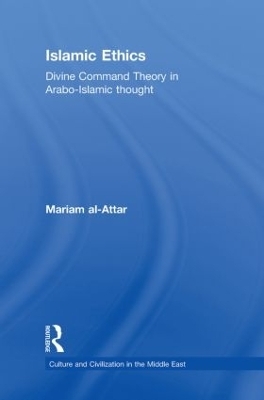
Islamic Ethics
Divine Command Theory in Arabo-Islamic Thought
Seiten
2010
Routledge (Verlag)
978-0-415-55519-7 (ISBN)
Routledge (Verlag)
978-0-415-55519-7 (ISBN)
This book is about philosophical ethics in Arabo-Islamic thought. It examines "Divine Command Theory" and underscores the philosophical bases of religious fundamentalism that hinder social development and hamper dialogue between cultures.
This book explores philosophical ethics in Arabo-Islamic thought. Examining the meaning, origin and development of "Divine Command Theory", it underscores the philosophical bases of religious fundamentalism that hinder social development and hamper dialogue between different cultures and nations.
Challenging traditional stereotypes of Islam, the book refutes contemporary claims that Islam is a defining case of ethical voluntarism, and that the prominent theory in Islamic ethical thought is Divine Command Theory. The author argues that, in fact, early Arab-Islamic scholars articulated moral theories: theories of value and theories of obligation. She traces the development of Arabo-Islamic ethics from the early Islamic theological and political debates between the Kharijites and the Murji’ites, shedding new light on the moral theory of Abd al-Jabbar al-Mu’tazili and the effects of this moral theory on post-Mu’tazilite ethical thought.
Highlighting important aspects in the development of Islamic thought, this book will appeal to students and scholars of Islamic moral thought and ethics, Islamic law, and religious fundamentalism.
This book explores philosophical ethics in Arabo-Islamic thought. Examining the meaning, origin and development of "Divine Command Theory", it underscores the philosophical bases of religious fundamentalism that hinder social development and hamper dialogue between different cultures and nations.
Challenging traditional stereotypes of Islam, the book refutes contemporary claims that Islam is a defining case of ethical voluntarism, and that the prominent theory in Islamic ethical thought is Divine Command Theory. The author argues that, in fact, early Arab-Islamic scholars articulated moral theories: theories of value and theories of obligation. She traces the development of Arabo-Islamic ethics from the early Islamic theological and political debates between the Kharijites and the Murji’ites, shedding new light on the moral theory of Abd al-Jabbar al-Mu’tazili and the effects of this moral theory on post-Mu’tazilite ethical thought.
Highlighting important aspects in the development of Islamic thought, this book will appeal to students and scholars of Islamic moral thought and ethics, Islamic law, and religious fundamentalism.
Mariam al-Attar is a faculty member in the Department of Ethics, Philosophy and Religion at Kings Academy in Jordan.
Introduction 1. Theoretical and Historical Background 2. Ethical Presuppositions of The Qur’an and the Hadith 3. Pre-Mu‛tazilite Ethical Doctrines 4. Mu‛tazilite Ethics: Moral Interpretation of the Five Principles 5. Ethics of ‘Abd al-Jabbar: Presuppositions of Ethical Judgments 6. Analysis of Normative Ethical Judgments. Conclusion
| Erscheint lt. Verlag | 3.3.2010 |
|---|---|
| Reihe/Serie | Culture and Civilization in the Middle East |
| Verlagsort | London |
| Sprache | englisch |
| Maße | 156 x 234 mm |
| Gewicht | 570 g |
| Themenwelt | Geisteswissenschaften ► Philosophie ► Östliche Philosophie |
| ISBN-10 | 0-415-55519-1 / 0415555191 |
| ISBN-13 | 978-0-415-55519-7 / 9780415555197 |
| Zustand | Neuware |
| Haben Sie eine Frage zum Produkt? |
Mehr entdecken
aus dem Bereich
aus dem Bereich


